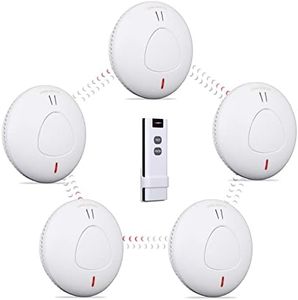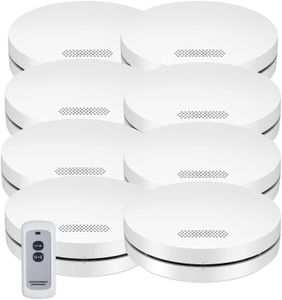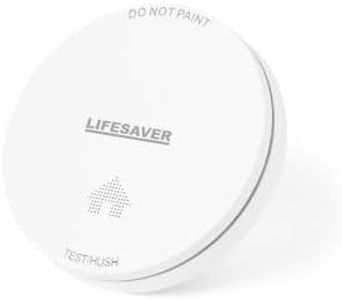We Use CookiesWe use cookies to enhance the security, performance,
functionality and for analytical and promotional activities. By continuing to browse this site you
are agreeing to our privacy policy
8 Best Smoke Alarm For Garage
From leading brands and best sellers available on the web.By clicking on a link to a third party's website, log data is shared with that third party.
Buying Guide for the Best Smoke Alarm For Garage
Choosing the right smoke alarm for your garage is about ensuring your safety in a challenging environment. Garages can have more dust, fumes, and sudden temperature changes than other parts of your home, so the smoke alarm you choose needs to handle these conditions reliably. Start by considering how the garage is used—is it primarily for parking, storage, a workshop, or some other purpose? Think about the types of risks present, such as flammable materials, electrical tools, or cars. Garage smoke alarms should be robust enough to avoid false alarms, but still provide sensitive and timely warnings if there’s a real danger. Understand where you want to install the alarm and make sure you're looking for features suited to the garage's unique environment.Sensor TypeThe sensor is the part of the smoke alarm that detects smoke or heat. There are two common types: ionization and photoelectric. Ionization alarms are good at spotting fast-burning, flaming fires, while photoelectric ones are better for smoldering, smoky fires. In garages, photoelectric sensors are often preferred because they are less likely to trigger false alarms from car exhaust or dust. If you do activities that create a lot of fumes, like woodworking or vehicle maintenance, choosing a photoelectric model can help reduce annoying interruptions while still keeping you safe.
Power SourceSmoke alarms can be powered by batteries or hardwired into your garage's electrical system, sometimes with a battery backup. Battery-powered alarms are easy to install and move, great for detached garages or older buildings. Hardwired alarms are more reliable as they don’t depend solely on batteries, but they require professional installation and may be best for garages that are part of the house. Consider how often you are in your garage; if it’s not frequently used, regular battery checks will be very important.
Temperature RangeGarages can get much colder or hotter than the inside of your house. Standard smoke alarms might not function properly in extreme temperatures. Look for smoke alarms that operate in a wide temperature range, often specified on the packaging or manual. If your garage is unheated in winter or gets very hot in summer, select an alarm designed for lower and higher temperatures to ensure it won’t malfunction when you need it most.
InterconnectivityInterconnected alarms communicate with each other, so if one alarm in your garage goes off, all alarms in the house will sound. This is useful if your garage is not directly attached to your living space, or if you might not hear it from indoors. There are wired and wireless models. If you’re often not in the garage or your garage is attached, choosing an interconnected alarm can give you extra peace of mind.
Smoke and Carbon Monoxide DetectionSome alarms detect just smoke, while others combine smoke and carbon monoxide (CO) detection in a single device. CO is a dangerous, odorless gas that can come from running cars or gas-powered tools. If you often leave your car running, use fuel-powered equipment, or have a water heater in the garage, a combination smoke and CO detector is a wise choice to protect against both types of risks.
False Alarm FeaturesSince garages are more likely to have smoke, dust, or fumes from vehicles and equipment, you’ll want an alarm with features that help minimize false alarms. These may include adjustable sensitivity, a hush or silence button, and specific technology to ignore nuisance triggers. If you use your garage for hobbies or projects, or if it's close to busy roads where exhaust can seep in, focus on alarms with these helpful features to avoid constant, unnecessary alerts.








